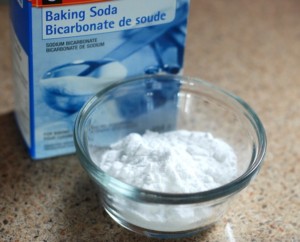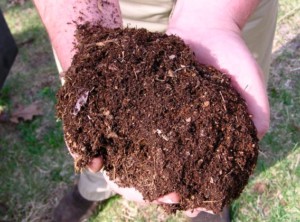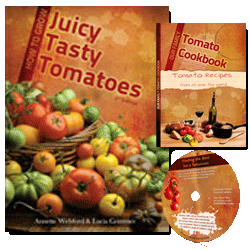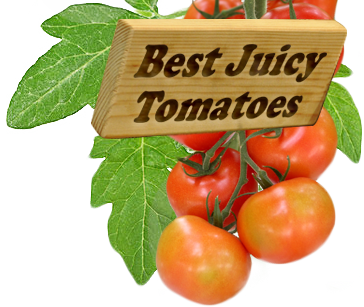Tomato Plant Nutrition: What Nutrients do Tomato Plants Need?
5 Sep
Every tomato grower has a ‘secret recipe’ for tomato growing success. An integral part of a high yield is proper tomato plant nutrition.
That’s right – plants need food, too! Giving a plant the right food at the right time will not only increase fruit yield, it will also help prevent damage from diseases and pests. Let’s take a closer look.
Plant Nutrients
 Plants do not eat hamburgers and French fries, but they do still need “nutrients.” Nitrogen, Phosphorus and Potassium are the three nutrients most commonly fed to plants. These are known as ‘primary nutrients’. Most fertilizers are a combination of the three. When reading a fertilizer package, a three number series such as 3-0-3, or 15-10-5, indicates the ratio of all three nutrients in the fertilizer.
Plants do not eat hamburgers and French fries, but they do still need “nutrients.” Nitrogen, Phosphorus and Potassium are the three nutrients most commonly fed to plants. These are known as ‘primary nutrients’. Most fertilizers are a combination of the three. When reading a fertilizer package, a three number series such as 3-0-3, or 15-10-5, indicates the ratio of all three nutrients in the fertilizer.
Other nutrients and minerals, in smaller amounts, help tomato plants grow robustly and healthily. These are known as ‘micronutrients’ and include Zinc, Chloride, Iron, Boron, Copper, and more.
Determining Which Nutrients Your Soil Needs
Plants get nutrients from the soil in which they are planted, so soil preparation is essential in creating ideal tomato plant nutrition.
To determine which nutrients your garden soil needs to promote healthy plant growth, you can prepare a soil sample and send it to your local cooperative extension office for analysis. The soil sample will allow you to properly prepare the garden soil and add just enough of each lacking nutrient to grow healthy plants.
Testing Soil pH
Another important test is the soil pH. Soil pH affects the way plants are able to take in nutrients. If your soil is too high or too low, you will want to amend the pH by adding mulch (to increase acidity) or lime (to increase alkalinity.)
Here’s an easy way to test your soil pH using vinegar and baking soda.
- Collect about 1 cup of soil from your garden and divide into two containers.
- Add 1/2 cup of white vinegar to one sample. If it fizzes, your soil is alkaline with a pH between 7 and 8.
- If it doesn’t fizz, add two tablespoons of distilled water to the other sample and mix until the soil is muddy.
- Add 1/2 of baking soda to the second sample. If it fizzes, your soil is acidic with a pH between 5 and 6.
- If neither sample fizzes, then your soil is neutral. Lucky you!
When to Add Nutrients

Flowering plants require a higher ratio of potassium.
To ensure proper tomato plant nutrition, you will need to add nutrients at differing amounts at various stages of growth. After receiving soil test results, checking your soil’s pH level, and before planting tomatoes, work a general fertilizer into the soil. NPK ratios of 5-10-10 or 8-16-16 are good to start. The soil test results will tell you if you are seriously lacking one nutrient or another.
Once the plant begins growing, different ratios of nutrients promote best growth. For example, once the plant starts flowering, it needs a higher ratio of potassium.
Soil Composition for Tomato Plant Nutrition
Adding fertilizer is only one step to providing plants with proper nutrients and increasing crop yield.
Soil composition and structure directly affects tomato plant health. Tomato plants thrive by growing roots deep into the soil. Hard clay soils must be broken and amended with compost to promote healthy root growth. Overly sandy soils need addition of organic matter in order to hold water and nutrients.
Compost for High Fruit Yield
Organic matter is an essential component of soil. Adding proper organic matter will greatly improve soil health, while adding improper organic matter is detrimental to soil.
Organic matter can be added by top dressing or double digging.
- Top dressing with organic works exactly as it sounds. You add organic matter to the top of the soil, almost like a mulch.
- Double-digging requires digging and removing soil, mixing the organic matter into the soil, and replacing the newly combined soil.
Great organic matters are already composted. As wood chips, leaves and other compost breaks down, it uses nitrogen. It is important to add composted organic matter rather than fresh, as fresh matter will remove essential nutrients from the soil. If fresh organic matter is all that is available, be sure to add nitrogen along with the organic matter.
 More on Tomato Plant Nutrition
More on Tomato Plant Nutrition
Soil composition, structure, pH, and nutrient availability all contribute to proper tomato plant nutrition, health, and yield. For more detailed information on soil health and how to manage nutrition properly (including diagnosing nutrient deficiencies), have a read of Chapter 9 in How to Grow Tasty Juicy Tomatoes.









